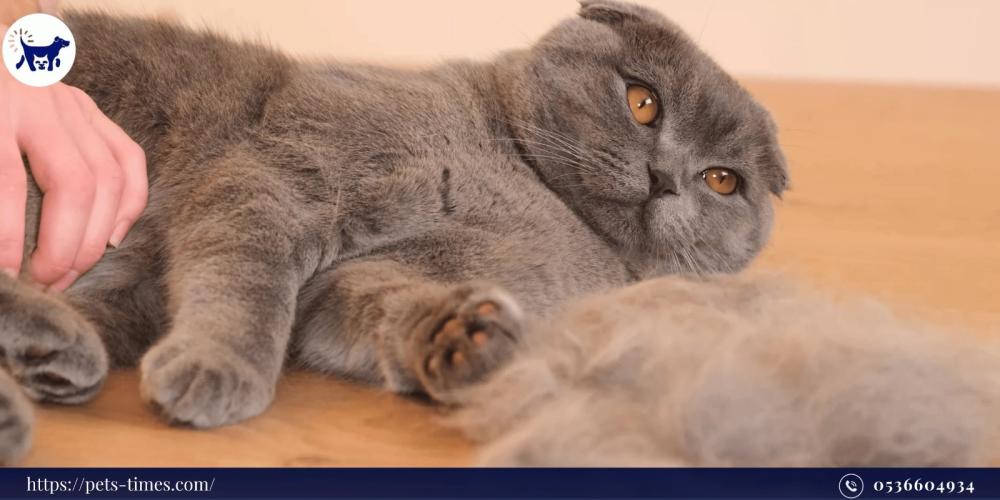What are hairballs in cats?
Hairballs in cats can be a normal part of life or a sign that something is wrong.
Cats often clean themselves by licking their fur and in the process inevitably swallow some of their fur.
Although cats cannot digest their hair, most of it passes through the digestive system without any problems, but sometimes it can collect in the stomach and form a hairball.
When the hairball becomes too large to pass through the intestines, the cat will usually vomit it up.
A cat hairball usually looks like a small, wet, cylindrical mass of compacted fur.
The hairball is usually somewhat tubular due to its passage through the cat's narrow esophagus.
Most are about an inch or two long, often appear tangled and dense, and can be unpleasant to handle due to their sticky consistency resulting from the cat's digestive fluids.
Causes of Recurring Hairballs in Cats
Here are some common causes:
- Long hair:
Long-haired breeds like the Persian may have more problems with hairballs simply because they have more hair.
- Hair loss season:
During the spring and fall, cats shed more hairballs, which can lead to more hairballs.
- the age:
Senior cats may groom themselves more frequently because they spend more time resting or indoors and they may also be less active which affects how well their digestive system works.
- Underlying health problems:
Frequent hairballs can be a sign of underlying health issues. Food allergies, pests, and other factors can cause skin problems such as itching or irritation and can lead to excessive grooming. Additionally, digestive problems may prevent hair from passing normally through the intestines.
- Excessive care:
Cats that groom themselves excessively are more likely to ingest fur, resulting in frequent hairballs. This over-grooming can be caused by stress, anxiety, or skin irritation.
How can I help my cat get rid of recurring hairballs?
Here are some effective ways to help your cat:
Over-the-counter hairball medications:
Hairball control gels like Laxatone work by softening the swallowed hair, allowing it to pass more easily through the digestive tract. These gels usually contain petrolatum or mineral oil.
Pets Time store offers you many products that your pet needs, such as:
Benefital Anti Hairball Paste for Cats 100g
GimCat Gastro Instinctual Cat Digestive Support 50g
GimCat Anti Hairball Control Cat Treat with Chicken 50g
Hairball-fighting cat food and treats:
These foods are high in fiber which helps improve the health of your cat's coat, reduce the amount of hair swallowed and make it easier for any hair swallowed to pass through the digestive system.
We recommend these rewards and you can get them from the Pets Time store:
Kit Cat Collagen Care Chicken & Collagen Cat Treats 15g×4
How can hairballs be reduced?
- Comb your cat's hair with its special comb regularly to remove dead hair.
- Give her a hairball softener.
- Use a hairball food if she has hairballs on a regular basis.
Pets Time store offers you many products that your pet needs, such as:
Dematting Comb for Cats and Dogs
Royal Canin Hairball Dry Cat Food
Happy Meow Dog and Cat Comb with Auto Clean Button
Royal Canin Indoor Dry Food for Long Haired Cats 2kg
Purinaon Hairball Dry Cat Food with Chicken for Hairball Control 1.2
How do I know when my cat needs veterinary intervention for cat hairballs?
Key signs that your cat needs to see a vet for a hairball problem:
- Vomiting or persistent coughing:
If your cat vomits or coughs repeatedly over several hours or days without producing a hairball, it may indicate that the hairball is stuck and potentially causing a blockage.
- Recurrent vomiting:
While it is normal for a cat to vomit a hairball from time to time, frequent vomiting, especially without producing a hairball, can be a sign of a gastrointestinal obstruction or other serious conditions.
- Change in appetite:
A decrease or complete loss of appetite is a worrisome sign, especially if your cat is also trying to cough up the hairball. This may indicate that the hairball is causing discomfort or a blockage.
- Laziness:
If your cat is less active than usual, seems lethargic, or shows little interest in daily activities, especially when trying to cough up a hairball, she may have a serious medical problem.
- Constipation or diarrhea:
If you notice changes in your cat's litter box habits such as constipation or signs of diarrhea, it may be related to a hairball obstructing the digestive system.
- Abdominal discomfort:
If your cat shows signs of pain or discomfort around her belly such as twitching when touched, whimpering loudly, or constantly licking the area, it may be a sign of an internal hairball issue.
In conclusion, closely monitoring your cat's behavior and health, especially when you know that she is prone to hairballs, can help you detect serious problems early and give your cat the care she needs, and most importantly, get her all the supplies and food to prevent such health problems.

